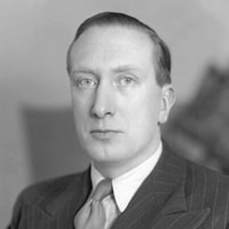
His first ventures into film music were in association with the Hungarian director/producer Paul Czinner. Walton did four scores for him, including Walton's first Shakespearean effort, As You Like It (1936) which starred Laurence Olivier. With the outbreak of World War II, Walton entered military service but was given leave to compose music for propaganda films based. One of these film tasks put him back in acquaintance with Olivier on Shakespeare's Henry V (1944). Having scored five war period films so far, this would be the first of three scores for Olivier's filmed Shakespeare plays. The score was nominated for an Oscar, and it remains perhaps the best known of Walton's film music.
After the war Walton continued to be a public favourite; once again Olivier wanted a score, now for his Hamlet (1948). The film was a landmark for the time and garnered four Oscars with Walton again being nominated for the score. He continued work on an opera (Troilus and Cressida, 1954) and his general musical output, which comprised over 75 works. Walton did no more film work until Olivier requested him for the third and final time for a score for Shakespeare’s Richard III (1955). Although the film proved to be the most popular and perhaps influential of Olivier's trilogy, it received only one nomination as best picture.
He scored the music for Battle of Britain (1969), but it was replaced only two weeks before the film was released. Walton composed his last big screen score-again for Olivier-this time for Three Sisters (1970).
Walton was knighted in 1951 and received the Order of Merit in 1968.
For fans of Basil Radford and Naunton Wayne, he made one acting appearance – this was in 1942’s Next of Kin where he played the uncredited part of a Soldier at the Security Briefing.
He died 8th March 1983.
 RSS Feed
RSS Feed